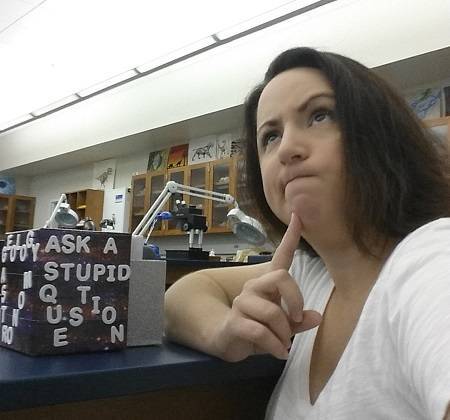
 I don’t remember how I got started. All I know is it started in high school. The first
time was such an adrenalin rush. My palms sweated. My mouth was so dry that my cheeks
stuck to my tongue. The walls of my throat felt like they were sticking together.
But once I started, I couldn’t stop. I would seek out my high school Vice Principal,
Mr. LePage, just so I could get my fix of asking him the stupidest questions I could
think up. “What is the face in the pictures of Mars?” “Will California really drop
into the Pacific Ocean?” “Which came first, the chicken or the egg?” It got to the
point where he would buy me a soda pop from the teacher’s lounge just so I would stop
annoying him, which only made me do it more.
I don’t remember how I got started. All I know is it started in high school. The first
time was such an adrenalin rush. My palms sweated. My mouth was so dry that my cheeks
stuck to my tongue. The walls of my throat felt like they were sticking together.
But once I started, I couldn’t stop. I would seek out my high school Vice Principal,
Mr. LePage, just so I could get my fix of asking him the stupidest questions I could
think up. “What is the face in the pictures of Mars?” “Will California really drop
into the Pacific Ocean?” “Which came first, the chicken or the egg?” It got to the
point where he would buy me a soda pop from the teacher’s lounge just so I would stop
annoying him, which only made me do it more.
When I came to college, I envisioned students sitting in class dying to learn. I expected
to see students eagerly raising their hands, actively participating in the Socratic
method of questioning. Instead, I found my classrooms uncomfortably quiet. Not even
the crickets in the biology labs would chirp when a professor asked a question.
As a student and a Supplemental Instructor, the lack of student participation perplexed
me. Too many students expressed to me that they don’t raise their hands out of fear.
They are afraid of looking stupid in front of their peers. They are intimidated by
the seemingly endless amounts of information their instructors seem to possess. So
they passively float from class to class with glassy-eyed stares and vacant expressions
not understanding a single word spoken in class.
The lack of student participation has not gone unnoticed in academia. Dr. Brenna Lorenz,
Assistant Professor Kevin Cole, and I, in my Supplemental Instructor role, have tried
to make the classroom experience as easy going as possible. Yet, participation is
still low. The story is the same everywhere on campus and in classrooms across the
country. In fact, K-12 teachers became so concerned with the problem that they began
a movement. They advocated for students to take an active role in their own academic
success by instituting a day dedicated to raising awareness. This day, known as national
“Ask a Stupid Question Day,” occurs annually on September 28. On this day, students
as well as the general public are encouraged to ask any question they think might
be a “stupid” question without fear of judgment.
In honor of my past and present students, I have decided to celebrate “Ask a Stupid
Question Day.” On Thursday, September 28, I will place a box and a stack of index
cards on the short desk in Harper’s Avanté Center, Room Z132. I invite anyone with
a question related to geology, paleontology or astronomy to write it out on the index
card and place it in the box. These questions may be anonymous, and the answers will
be posted outside of Room Z132.
It wasn’t until I became a Supplemental Instructor that I realized that Vice Principal
LePage wasn’t annoyed with me at all. He might not have known the answers to my questions,
but he was still more clever than I. Now, I understand that he wasn’t bribing me to
stop talking to him. He was sneakily rewarding me for observing and questioning the
world around me. He knew that if he gave me a soda pop for every question, I would
turn around and actively search for more questions. Curiosity became addictive, and
I haven’t stopped questioning and searching for answers.
When I was a kid, they used to say that the more knowledge a person acquires the more
one’s brain wrinkles. I look at my students with their unasked questions and their
distressed minds. I want to soothe their anxieties and help them feel free to investigate
their world. I want to help them get their very own brain wrinkles. Wrinkles that
will stay with them forever. Wrinkles that will lead to other wrinkles until their
brains look like raisins!
By the way, if you really want to know what is the “face” in the picture of Mars,
take Astronomy 112. If you want to know if California will fall into the Pacific Ocean,
take Earth Science 111. And if you want to know, definitively, which came first, the
chicken or the egg, take Earth Science 112. Now go forth and get yourself some wrinkles.
I don’t know if knowledge really gives a person brain wrinkles… It’s a good question,
though… I think it deserves a soda pop.
The Supplemental Instruction (SI) program targets traditionally difficult academic subjects and provides regularly scheduled, out-of-class, peer facilitated sessions. SI leaders are students who have successfully completed the course in a previous semester, and they are chosen by the faculty member with whom they will work. Research here at Harper has shown that students who attend SI sessions are more likely to succeed in their classes and more likely to continue the following semester.